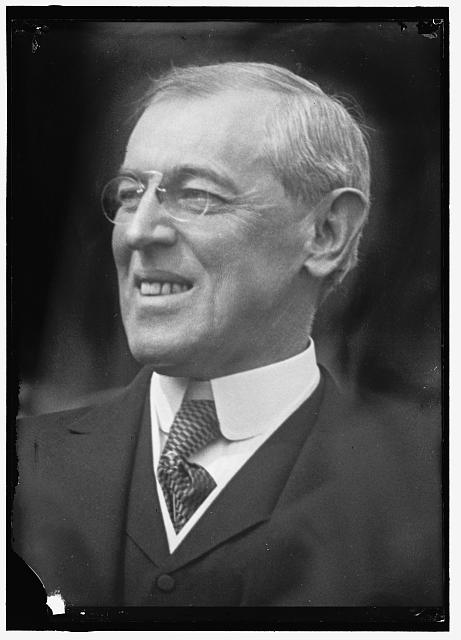Woodrow Wilson, the 28th President of the United States, served from 1913 to 1921, a period marked by significant global changes and internal American reforms. A key aspect of his foreign policy was “Moral Diplomacy,” a term that encapsulates his vision of promoting democratic ideals and moral righteousness in international affairs. Wilson’s approach was a stark departure from the more traditional and interventionist policies of his predecessors, emphasizing human rights, self-determination, and democratic governance.
The Foundations of Moral Diplomacy
Wilson’s Moral Diplomacy was rooted in his belief that the United States had a moral obligation to lead by example and promote democracy worldwide. He argued that democracy and freedom were universal values that the U.S. should support and foster. This philosophy was reflected in his assertion that “The world must be made safe for democracy,” a sentiment he famously expressed when advocating for U.S. entry into World War I.
Principles of Moral Diplomacy
- Promotion of Democracy: Wilson believed that democratic nations were inherently more peaceful and stable. By supporting democratic governments, he hoped to create a world order that would be more conducive to peace and cooperation.
- Self-Determination: He championed the right of people to choose their own governments, free from external domination. This was particularly relevant in the context of the collapsing empires in Europe and the rise of nationalist movements around the world.
- Human Rights and Justice: Wilson’s diplomacy emphasized the protection of human rights and the application of moral principles in international relations. He sought to align U.S. foreign policy with ethical standards, rejecting practices that were deemed exploitative or unjust.
Implementation and Challenges
While Wilson’s moral ideals were lofty, the practical application of Moral Diplomacy faced numerous challenges and contradictions.
- Latin America: Wilson’s policies towards Latin America were a mix of moral intentions and interventionist actions. He opposed the oppressive regimes in the region and supported movements for democratic reform. However, his administration also intervened militarily in several countries, such as Mexico, Haiti, and the Dominican Republic, when U.S. interests were perceived to be at risk or when he deemed it necessary to stabilize the region.
- Mexico: The Mexican Revolution posed a significant test for Wilson’s Moral Diplomacy. He initially refused to recognize General Victoriano Huerta’s government, labeling it a “government of butchers” due to its undemocratic rise to power. Wilson supported Venustiano Carranza, a more democratic leader, but his decision to occupy the port of Veracruz in 1914 led to tensions and accusations of imperialism.
- Haiti and the Dominican Republic: Wilson’s administration intervened in Haiti in 1915 and the Dominican Republic in 1916, ostensibly to restore order and support democratic governance. However, these occupations often contradicted the very principles of self-determination and non-intervention that Wilson espoused. The U.S. interventions were criticized for their heavy-handedness and the establishment of military governments.
- World War I: Wilson’s greatest test of Moral Diplomacy came with World War I. Initially, he maintained a stance of neutrality, emphasizing the U.S.’s role as a peace broker. However, as the war progressed and the reality of German aggression became more apparent, Wilson shifted towards supporting the Allies. His decision to enter the war in 1917 was framed as a moral crusade to make the world “safe for democracy” and to ensure a just and lasting peace.
The Fourteen Points
Wilson’s vision for post-war peace was encapsulated in his Fourteen Points, presented to Congress in January 1918. These points outlined his ideas for a new international order based on transparency, free trade, disarmament, and self-determination. The most significant of these was the proposal for the League of Nations, an international organization aimed at ensuring peace and cooperation among nations.
- Self-Determination: Wilson advocated for the redrawing of national boundaries based on the principle of self-determination, particularly in Europe where many ethnic groups were seeking independence from empires.
- League of Nations: Perhaps the most ambitious aspect of his vision, the League of Nations was intended to provide a platform for resolving international disputes through dialogue and collective security arrangements..
Legacy and Criticism
Wilson’s Moral Diplomacy had a mixed legacy. On one hand, it introduced the idea that U.S. foreign policy should be guided by ethical principles and the promotion of democracy. This idealistic approach influenced future American diplomacy and contributed to the U.S.’s self-image as a global promoter of democratic values.
However, the contradictions and failures in its implementation drew significant criticism. The interventions in Latin America and the inability to fully realize the ideals of self-determination and non-intervention highlighted the complexities and limitations of moral-based foreign policy. Moreover, the U.S. Senate’s refusal to ratify the Treaty of Versailles and join the League of Nations marked a significant setback for Wilson’s international vision.
Woodrow Wilson’s Moral Diplomacy was a pioneering attempt to infuse U.S. foreign policy with ethical considerations and democratic ideals. While it faced significant challenges and contradictions, it set a precedent for the United States to engage with the world not only as a powerful nation but as a moral leader. The complexities of its implementation underscore the difficulties inherent in aligning foreign policy with moral imperatives, a challenge that continues to resonate in contemporary international relations.
